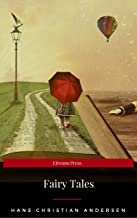A few weeks ago, I took my younger pair of granddaughters – aged 11 and 7 – to Little Angel Theatre in Islington to see The King of Nothing. Ben Glasstone’s delightful, gently topical, account of The Emperor’s New Clothes ticked lots of boxes for all three of us and we wrote the review, collaboratively, on the way home. It also made me realise what a long time it had been since I’d actually read any of Hans Christian Andersen’s stories, familiar as many of them are from numerous adaptations, versions and reworkings.
Did the copy – Collins with a green mock leather cover and nice binding – that I’d had since I was eleven survive the big downsizing cull six years ago, I wondered? Happily, yes it did and there it was sitting waiting for me on the top shelf in the sitting room.
Well, I had some acquaintance with these stories from infancy: I saw the film Hans Christian Andersen (1952) starring Danny Kaye several times because my mother liked it. Then there was Children’s Favourites on the radio on Saturday mornings from 1954 to 1982 (a major strand in my musical education) where the Hans Christian Andersen songs were continually aired. I still know most of them by heart. And writing this has made me yearn to see the film again. If you’re an Amazon Prime member it’s free to view, apparently. So that’s a project for the next time I have an evening in.
Actually reading the stories – my set was first published in 1835 – from The Red Shoes to The Little Mermaid from The Fir-Tree to Little Ida’s Flowers and from The Ice Maiden to The Tinder Box and 29 others, certainly leaves you marvelling at the imaginative range and asking questions about the author.
I’m obviously not the first person to notice that many of these stories are about otherness and rejection or inclusion. So, given that he never married, there has long been speculation about Andersen’s sexuality. Was he gay? It certainly fits as an interpretation of The Ugly Duckling if you want to read it that way. The “duckling” is different, doesn’t understand why and feels very lonely and miserable. Then he meets some beautiful swans and realises that he’s one of them. On the other hand, it’s just a very strong story about someone – man, woman or child – who doesn’t quite fit in but eventually makes friends. It works at any level you want it to and that is probably why we’re still reading and enjoying it nearly two centuries after it was written.
There’s also a lot of pain and anguish in these stories. The Little Mermaid, for instance, is as brutal as anything by the Brothers Grimm (we usually feed children sanitised versions these days). Remember her tongue was hacked out, she suffered excruciating pain in her newly granted legs and she didn’t even get the Prince she wanted. Even at my advanced age I found this really quite disturbing to read. In a different way The Fir-Tree is a painful story too. So is The Constant Tin Soldier.
I suspect Hans Christian Andersen wasn’t the easiest of people to get on with either. There’s a famous story of his going to stay with Charles Dickens in London and overstaying his welcome. Odd too that he wrote prolifically: novels, plays and articles. But his real gift was clearly in gothic stories – published in batches throughout his life which (QED) aren’t always very child-friendly. Almost everything else he wrote is forgotten.
Of course some of the stories are better than others but many are compelling and often lyrically beautiful. I think they might work better in a modern translation, though. My old 1954 edition has an introduction by Margaret WJ Jeffrey but doesn’t credit a translator. The use of “thee” and “thou” for intimacy grates a bit in 2022 and some of the turns of phrase (“pillowing his head upon her bosom” “Far hence, in a country, whither the swallows fly”) seem a bit quaint to a 21st century reader, even a traditionalist one like me.
Next week on Susan’s Bookshelves: An Experiment in Love by Hilary Mantel
